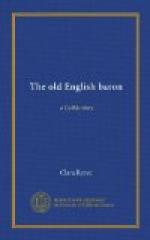Sir Robert came forward with tears on his cheeks; he kneeled to his father.
“Best of parents, and of men!” said he; “you have subdued a heart that has been too refractory to your will; you have this day made me sensible how much I owe to your goodness and forbearance with me. Forgive me all that is past, and from henceforward dispose of me; I will have no will but yours, no ambition but to be worthy of the name of your son.”
“And this day,” said the Baron, “do I enjoy the true happiness of a father! Rise, my son, and take possession of the first place in my affection without reserve.” They embraced with tears on both sides; The company rose, and congratulated both father and son. The Baron presented his son to Lord Clifford, who embraced him, and said:
“You shall have my daughter, for I see that you deserve her.”
Sir Philip Harclay approached—the Baron gave his son’s hand to the knight.
“Love and respect that good man,” said he; “deserve his friendship, and you will obtain it.”
Nothing but congratulations were heard on all sides.
When their joy was in some degree reduced to composure, Sir Philip proposed that they should begin to execute the schemes of happiness they had planned. He proposed that my Lord Fitz-Owen should go with him to the Castle of Lovel, and settle the family there. The Baron consented; and both together invited such of the company, as liked it, to accompany them thither. It was agreed that a nephew of Lord Graham’s, another of Lord Clifford’s, two gentlemen, friends of Sir Philip Harclay, and father Oswald, should be of the party; together with several of Sir Philip’s dependants and domestics, and the attendants on the rest. Lord Fitz Owen gave orders for their speedy departure. Lord Graham and his friends took leave of them, in order to return to his own home; but, before he went, he engaged his eldest nephew and heir to the second daughter of the Lord Clifford; Sir Robert offered himself to the eldest, who modestly received his address, and made no objection to his proposal. The fathers confirmed their engagement.
Lord Fitz-Owen promised to return to the celebration of the marriage; in the mean time he ordered his son to go and take possession of his uncle’s house, and to settle his household; He invited young Clifford, and some other gentlemen, to go with him. The company separated with regret, and with many promises of friendship on all sides; and the gentlemen of the North were to cultivate the good neighbourhood on both sides of the borders.
Sir Philip Harclay and the Baron Fitz-Owen, with their friends and attendants, set forwards for the Castle of Lovel; a servant went before, at full speed, to acquaint the family of their approach. Edmund was in great anxiety of mind, now the crisis of his fate was near at hand; He enquired of the messenger, who were of the party? and finding that Sir Philip Harclay was there, and that Sir Robert Fitz-Owen stayed




